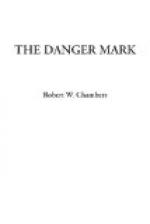CHAPTER XVIII
BON CHIEN
The chronology of that last dark and bitter week in November might have been written “necrology.”
On Monday Colonel Mallett died about sundown; on Wednesday the Hon. John D. Ellis, while examining an automatic revolver in his bath-room, met with one of those unfortunate and fatal accidents which sometimes happen in times of great financial depression.
Thursday Amos Flack carelessly disappeared, leaving no address; and on the last day of the week Emanuel Klawber politely excused himself to a group of very solemn gentlemen who had been assisting him in the well-known and popular game of “Hunt the Books”; and, stepping outside the door of the director’s office, carefully destroyed what little life had not already been scared out of his three-hundred-pound person.
It had been raining all day; Dysart had not felt very well, and Klawber’s unpleasant performance made him ill. He stood in the rain watching the ambulance arriving at a gallop, then, sickened, turned away through the dark and dripping crowds, crossed the street, and, lowering his head against the storm, drove both gloved hands deep into the pockets of his fashionably cut rain-coat, and started for home.
It mattered nothing to him that several hard-working newspaper men might desire to secure his version of Mr. Klawber’s taking off, or of his explanation for it or his sensations concerning it. It mattered nothing to him that the afternoon papers reported the arrest of James Skelton, or that Max Moebus had inadvertently, and no doubt in a moment of intense abstraction, taken a steamer for Europe and the books of the Shoshone Bank.
These matters, now seemed a great way off—too unreal to be of personal moment. He was feeling sick; that occupied his mind. Also the slush on the sidewalk had wet through his shoes, which probably was not good for his cough.
It was scarcely two in the afternoon, yet there remained so little daylight that the electricity burned in the shops along Fifth Avenue. Through a smutty, grayish gloom, rain drove densely; his hat and waterproof coat were heavy with it, the bottoms of his trousers soaked.
Passing the Patroons Club it occurred to him that hot whiskey might extinguish his cough. The liveried servants at the door, in the cloak-room—the page who took his order, the white-headed butler who had always personally served him, and who served him now, all hesitated and gazed curiously at him. He paid no attention at the time but remembered it afterward.
For an hour he sat alone in the vast empty room before a fire of English cannel coal, taking his hot whiskey and lemon in slow, absent-minded gulps. Patches of deep colour lay flat under his cheek-bones, his sunken abstracted eyes never left the coals.
The painted gaze of dead Presidents and Governors looked down at him from their old-time frames ranged in stately ranks along the oaken wainscot. Over the mantel the amazing, Hebraic countenance of a moose leered at him out of little sly, sardonic little eyes, almost bantering in their evil immobility.




